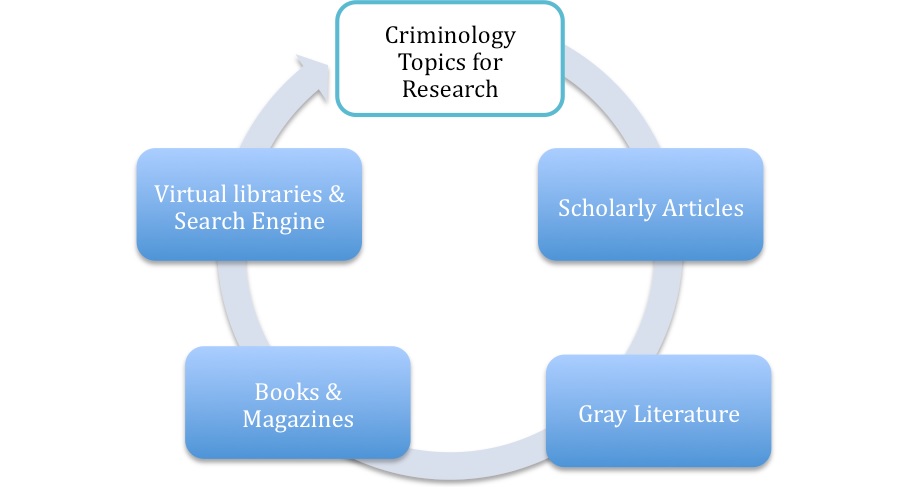Which would be the right way to identify my topic for criminology
Introduction
- Criminology, a fascinating branch of sociology and behavioral science is the study of crimes, its true motivation, finding the criminals, identifying the cause and consequence, preventing deviance and also focuses on several other topics like crime behavior, forecasting, theories and ways of prevention etc.
- Crime theories and schools of thoughts throws light on getting a deeper insight into the crime system, its models, handling crimes and how the world dwells with it.

To identify your topic of criminology studies an array of resources needs to be reckoned which is to be discussed below
Ways to identify my topic for criminology
Criminology is a modern science with a vast number of outgrowths that has gained massive momentum in the recent decades. Although it is certainly obvious that social media and e-sources are the ideal and most renowned modes of finding the right topics of criminology for dissertation and research purposes, they may also present setbacks such as being less specific, non-reliable, outdated etc.
Herewith, we have enlisted the professional and typical methods of finding your topic for dissertation based on our critical survey. Before heading ahead, we would like to emphasis that criminology as a subject consists of a number of disciplines (basic and applied) that are based on methods and techniques of natural and the social sciences. Hence a vast literature survey may enable the researcher to choose his/her topic of interest
Open web sources
The most common way of finding criminology topic is through open source Internet however they are not completely reliable and do not hold strong scientific background. However, this may enable the author to get a broad picture of the current trends and are not solely reliable for finalizing the dissertation topic.
Core Scholarly Journals/ Articles
Literature survey through“Scholarly Journals” is the most recommended way of finding the topic of interest in criminology. Scholarly articles are reliable and tested methods and theories published by experts in the respective field, hence may offer new leads for the researchers. These articles adhere to notable formats of presenting the data and undergo a peer review process.
Find below listed are some of the prime criminology scholarly journals where one can find latest and most appropriate topics on criminal sciences
- Criminology
- Justice Quarterly
- Journal of Criminal Law and Criminology
- American Journal of Criminal Justice
- British Journal of Criminology
- Journal of Research in Crime and Delinquency
- Journal of Interpersonal Violence
- Deviant Behavior
- Criminology: an interdisciplinary journal
- Criminal Justice and Behavior
- Crime and Delinquency
- Journal of Experimental Criminology
Book chapters, Hand books and Encyclopedias
Books are still the oldest and yet the convention sources of basic and advance information in any subject. Criminal science experts, chief judges, researchers and professionals are often prompted to write a book or contribute to book chapters on their field of expertise as this may add value to the subject and may reach a larger population. These chapters and books are vital sources containing a pool of information on diverse aspects of the chosen study.
Some of the latest books on criminology are listed herewith: The Routledge International Handbook of Life-Course Criminology, Arjan Blokland & Victor van der Geest, 2017; Criminology: The Essentials Fourth Edition by Anthony Walsh & Cody Jorgensen, 2020.
Gray Literature
Another classic way of identifying the topics for studies on criminology is ‘gray literature’. Gray literatures are significant informative contents that include non-conventional, momentary reports, episodic publications. Theoretically “Grey literature encompasses manifold documents generated by government, academics and industry at every hierarchical level and stays conserved by intellectual property rights. These documents are not open for commercial publishers and are a part of national libraries and repositories (Duke Health, 2020). Classic examples of gray literature are case proceedings, regulatory data, trial data, government publications, reports (white papers), thesis abstracts, governmental policies etc.
Gray literature sources for criminology
It is an arduous process to attain the relevant literature via gray literature. One should be able to explore the utmost relevant sources pertaining to their research question. In most instances, abstracts and proceedings provide insights into the topic of interest. Interesting findings can be made on criminal science research topics as theory and practice goes hand in hand.
Gray literature on criminology may lessen/avoid favoritism, non- standard publication, and may enable the user to obtain a comprehensive picture of the actual criminal case, its evidence and the trials carried out (Paez, 2017). The following are the classic examples of gray literature sources for criminal sciences and can provide deeper insights for the user.
- National Criminal Justice Reference Service (NCJRS)
Specific information on criminal cases, corrections, court trials, strategies for crime prevention, drugs, juvenile justice, law enforcement, and victims
- American Society for Criminology
The American Society of Criminology is an international organization and is concerned with evaluation, etiology, consequences, prevention, control, and treatment of crime and delinquency. The database has basic and applied information and has immense scope for topic selection for dissertation
Source: https://www.asc41.com/divisions.html
- Bureau of Justice Statistics
This portal is highly resourceful in providing statistics based data on common crimes, justice system, law and order, court sentences etc.
- The National Institute of Justice (NIJ)
It is a massive collection of research topics and can be high resourceful for researchers to land at their topic of interest in criminology.
Source: http://www.nij.gov/Pages/welcome.aspx
Virtual libraries, magazine and search engines:
Other plausible modes to identify criminology topics is to explore the virtual libraries, magazine (For example: Criminal Justice Magazine (ABA, 2020)) and specific search engines such as the ‘CQ Global Researcher’ that provides the researcher with updated information on political and social scenario of a nation in a global viewpoint; Research gate, Academia. edu etc.
Conclusion
Criminology is a fascinating branch of science that technically involves the documentation of factual information about criminal act, scene and shaping of theories to help sustain and prove the information obtained from the crime. One may explore the world of resources as highlight in this blog (Fig.1) to get a broader picture of the various aspects of the criminal sciences and may select his or her topic of research based on what triggers one’s interest quotient.
Future scope
A lot of other modes of exploring this topic may evolve and the blog may be updated there after for the benefit of the readers. A country wise database of gray literature sources; criminal and justice oriented magazine, e-library sources may also be included to provide value addition and continued support to the researchers.
Figure 1: Ways to identify your topic of research in criminology

References
- ABA (2020). Criminal Justice Magazine. [Online]. 2020. AMERICAN BAR ASSOCIATION. Available from: https://www.americanbar.org/products/sub/maga/110546/?q=&wt=json&start=0. [Accessed: 4 July 2020].
- Duke Health (2020). Systematic Reviews: the process: Grey Literature. [Online]. 2020. Available from: https://guides.mclibrary.duke.edu/sysreview/greylit. [Accessed: 4 July 2020].
- Paez, A. (2017). Gray literature: An important resource in systematic reviews. Journal of Evidence Based Medicine. [Online]. 10 (3). pp. 233–240. Available from: https://onlinelibrary.wiley.com/doi/abs/10.1111/jebm.12266.

 Previous Post
Previous Post Next Post
Next Post